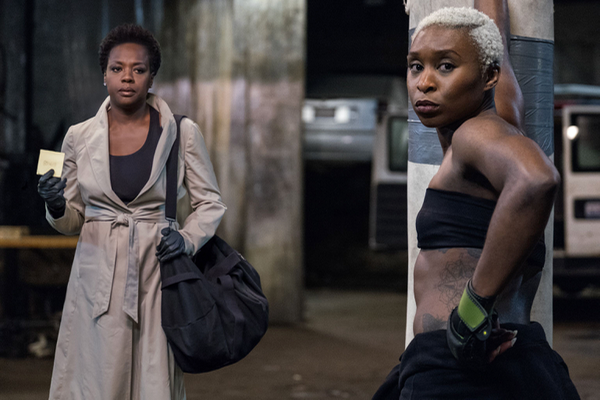Movie review by Greg Carlson
Were it not for Steve McQueen’s professed admiration of the 1980s television series upon which his new movie is based, “Widows” might seem an unusual choice for the prestige filmmaker of “12 Years a Slave,” “Shame,” and “Hunger.” An often ridiculous Chicago-set heist movie with thematic interests in race, politics, gender, and power, McQueen’s film is easily better than utterly forgettable junk like “Triple 9” and “Den of Thieves.” McQueen shares screenplay credit with Gillian Flynn, but the two never completely move beyond the episodic structure beholden to the juggling of a huge ensemble cast. The result plays out very much like an episodic pilot.
Still, “Widows” has plenty to recommend it, starting with the central performance of Viola Davis as Veronica Rawlings, a teacher’s union representative married to the very well-connected professional criminal Harry (Liam Neeson). Following an introductory scene in which McQueen puts the viewer in bed with the couple for a lusty morning make-out session, a smash cut rudely kicks us to the in medias res action of Harry and his gang attempting to escape an armed robbery gone wrong. Bullets fly, a van explodes into flames, and Veronica instantly joins the title club. Facing terrifying pressure from a crooked candidate running for office — as if there is any other kind — to whom Harry owes two million bucks, Veronica reaches out to the other bereaved wives of the men killed alongside her husband.
Her plan? Use the instructions and contents of Harry’s secret notebook to commit a spectacular burglary. Mastermind Veronica convinces two widows to join up, and McQueen efficiently communicates plausible reasons for taking on such life-threatening risk. Michelle Rodriguez’s Linda is on the verge of losing her dress shop. Elizabeth Debicki’s Alice, a victim of abuse by her dominant mother (Jacki Weaver), sees little to lose and much to gain. A fourth widow, Carrie Coon’s Amanda, opts out, raising a very red flag for the sharp-eyed viewer.
As Veronica prepares to pick up where Harry left off, McQueen fills out the story with a nearly unwieldy number of important players. Power-broker Tom Mulligan (Robert Duvall) and his son Jack (Colin Farrell) engineer a campaign to retain a long-held south side alderman seat. Jack’s opponent is Jamal Manning (Brian Tyree Henry), whose brother Jatemme (Daniel Kaluuya) is a violent sociopath/enforcer who carries out the dirty work with cold calculation. Linda’s babysitter Belle (Cynthia Erivo) joins the widows as a wheelwoman. David (Lukas Haas), a wealthy businessman in real estate, pays for the company of Alice when her mom pushes her into escort work.
Even in this pulpier terrain, McQueen’s direction is skillful and visceral. In one artsy scene, he keeps the camera outside a moving car for the duration of the conversation taking place within. He prioritizes the desperation of the women, and finds some remarkable places to take Alice (Debicki almost walks off with the movie). Whether intimate and quiet or dynamic and deafening, scenes are staged with precision and vitality. For many, McQueen’s stylishness will help excuse the rubbery plot holes, lapses in logic, and farfetched surprises that might lead some to wonder how the movie might have unfolded as a leaner, tighter operation.
